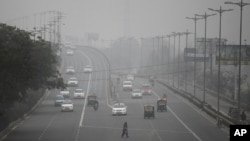India's capital ended its odd-even car experiment, which was designed to reduce the city's record-breaking air pollution, Friday.
The experimental measure, started at the beginning of the year in New Delhi, had cars only with odd-numbered license plates on the capital's streets on odd-numbered days. Cars with even-numbered plates were allowed on even-numbered days.
A 2014 World Health Organization survey identified New Delhi as the world's most polluted city, partly because of the millions of vehicles clogging the city's streets.
The Delhi government said the city's pollution dropped by "more than 50 percent" during the past two weeks. However, it was not immediately clear how the results were measured or whether the odd-even scheme would become permanent.
Drivers seemed to follow the rules during the testing period. In a city where roads are usually choked with cars, many citizens used public transport, autorickshaws, cabs and bicycles, and arranged car pools or simply stayed home.
Violators faced a $30 fine, a significant amount for most Indians.
There were a number of exemptions to the odd-even scheme, including for women drivers.





